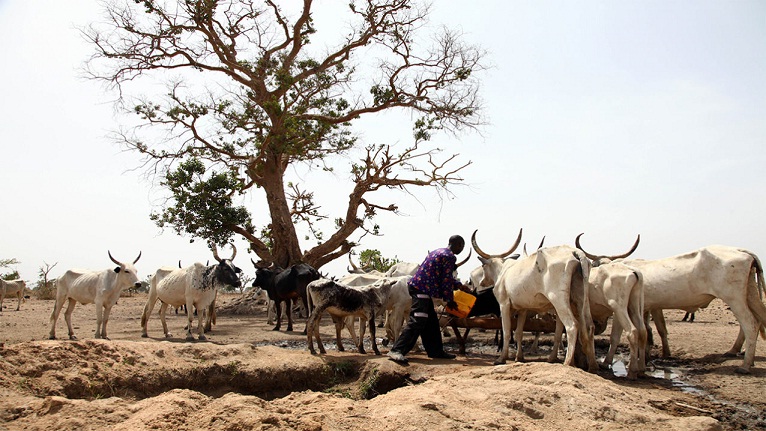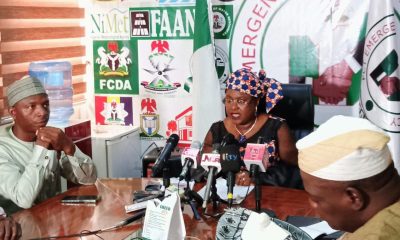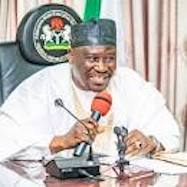NEWS
Group Urges Buhari to Rebuild Communities Wrecked by Herdsmen- Farmers Crises, Not Ruga.

A non- profit organization, the Greater Restoration Initiative (GRI), has condemned what it called the land grab initiative by the federal government in the name of building Ruga or Fulani settler communities in all the 36 states of Nigeria and the FCT with tax payers money.
The group wondered why the pilot phase which would be implemented in 12 states has “surreptitiously” commenced without consultation with the states or local communities concerned.
“We note the latent deceit laced in the policy, which is why the Federal Ministry of Agriculture and Rural Development refused to brief the country before it commenced implementation of the so-called National Lifestock Transformation Plan being supervised by the Office of the Vice President.
“We note the Vice President’s disclaimer on the Ruga initiative. He however wasn’t enough to explain who is supervising it and why?” GRI said in a statement in Abuja signed by its leader, Mr James Mozeh.
The Ruga policy, it noted was criminal as it violated the Land Use Act which spelt out unambiguously where the control of land resource is vested. It also violates the foundamental human rights of the locals who traditionally own those lands, as the state governments only hold the land in trust for them as per the Land Use Act. It’s disheartening that the Vice President, Prof. Yemi Osinbajo, a Professor of Law, who recommended the Ruga has decided to protect his political career rather than speak for the truth and the rule of law.
“It’s also becoming increasingly worrisome that President Buhari who prides himself as Mr. intergrity will supervise and endorse illegality just because his kinsmen are the beneficiaries. Indeed posterity has an unkind place for nepotic and ethnic irredentist leaders.
“It is disheartening that in excess 500,000 Benue citizens and millions across the country, are displaced and living in unhabitable temporal shelters without any significant support from the federal government. Rather than resettle them, the president is more concerned about building homes for his kinsmen across the country.”
According to the group, the law – abiding sedentary farmers had suffered several attacks from Fulani herders who now occupy some of their ancestral lands.
GRI also recall that during the Vice President’s visit to Benue state at the wake of sustained Fulani herdsmen attacks on Benue, Taraba, Nasarawa and Kogi states villages, he promised the FG will provide N10bn in support to the affected communities to enable them rebuild their communities and return to their lives. Till date, nothing has been done about it and the federal government hasn’t helped any community rebuild. Yet the FG has set aside over N2.26 billion in tax payers money to forcefully build settlements for Fulani herders. Are the Fulanis more Nigerian than the rest over 400 tribes in Nigeria?
“We at GRI completely oppose the Ruga policy, we oppose the cattle colony, grazing route or grazing reserve initiatives. They are not only archaic but will further deepen the crisis that has already claimed thousands of lives across the country. Should the government forcefully choose to implement this anti-native settlers policies, the president should know he will be held responsible for any unrest associated with it,” the statement said.
NEWS
Tinubu Approves Management Unit for Health Sector Renewal Investment Initiative
President Bola Tinubu has approved the establishment of the Sector-wide Coordinating Office-Programme Management Unit (SCO-PMU) domiciled in the Office of the Coordinating Minister of Health and Social Welfare.A statement on Friday by his spokesman, Chief Ajuri Ngelale, said the unit would ensure efficient, transparent and accountable management of external grants mobilised towards the implementation of the Nigeria Health Sector Renewal Investment Initiative (NHSRII).
Ngelale said SCO-PMU would report to a Steering Committee/Ministerial Oversight Committee chaired by the Minister, including the Minister of State, Permanent Secretary; Ministry of Finance, Ministry of Budget and Economic Planning and relevant development partners. “The SCO-PMU will serve as the secretariat and delivery unit for the NHSRII and is to be headed by a national coordinator (NC).“The functions of the SCO-PMU include programme management, monitoring and evaluation, engagement and supervision of Independent Verification Agents (IVAs) for NHSRII programmes and fiduciary management, among others.“Consequently, the President has approved the appointment of Dr. Muntaqa Umar Sadiq as the National Coordinator of SCO-PMU,” he said.Report says that Sadiq has over 17 years of experience in public health, impact investing, investment banking, energy, and climate financing across the health, finance, climate and energy sectors.He had served as Head of the Performance Management and Delivery Unit at the Federal Ministry of Health and Social Welfare and Chief Executive Officer of the Private Sector Health Alliance of Nigeria.He also served as Head of the Nigeria Energy Transition Office and Private Sector Engagement Adviser at the World Bank. (NAN)
Education
FG Denies Slash in Students’ Allowances

The Federal Government says it has no plan to slash scholarship students’ allowances as recently projected in the media.The Minister of Education, Prof. Tahir Mamman, stated this during a meeting with the leadership of the National Association of Nigerian Students (NANS) in Abuja on Friday.
Report says that there was a report that the ministry, through the Federal Scholarship Board, announced a slash in allowances of foreign scholars stranded in Russia, Morocco, and Algeria among others.
The slash in scholars’ allowances under the federal government’s Bilateral Educational Agreement Scholarship (BEA) was attributed to the economic crises.Mamman said that there was no slash in scholars` allowances but rather an adjustment due to Foreign Exchange fluctuations (FOREX).“We want to clarify what has been in the media on allowances paid to scholars under the Bilateral Scholarship Agreement.“We want to place it on record that the ministry and the Federal Government for that matter have not slashed the allowances due to students.“What happened is some adjustments in the amount due to them because of FOREX fluctuations, and as soon as we get the balance we have applied for, we will pay them.“But for now, what is in the budget is what we can pay. So, there is no slash, we will even be happy to increase, so this is what has led to the adjustments,” he said.(NAN)NEWS
Planned Protests: CAN calls for calm and patience

By Laide Akinboade, Abuja
The Christian Association of Nigeria, CAN, on Friday, has urged Nigerians to calm and patient with Federal Government and should give the the government more time to address these pressing concerns.In a statement issued by CAN and signed by Archbishop Daniel Okoh ,President, CAN and made available to journalists in Abuja.
CAN also urged all Nigerians to consider alternative means of expressing their grievances. He however said CAN stands in solidarity with the citizens of nation during these challenging times of economic hardship and pervasive hunger. The statement reads in part, “As we navigate this period of crisis, it is imperative to uphold the constitutional rights of every Nigerian to peacefully protest and express their grievances. The right to assemble and voice discontent is a cornerstone of our democracy and must be protected and respected by all. Peaceful protests are a powerful tool for civic engagement, allowing the populace to communicate their concerns and hold leaders accountable. However, the anxiety related to the impending protests is heightening, especially given the volatile experiences in countries like Kenya and Pakistan.”We must also draw from our recent history. The #ENDSARS and #RevolutionNow protests, though rooted in genuine grievances, were marred by tragic incidents where miscreants hijacked the process. This led to widespread looting, destruction of properties, and unfortunate loss of lives. These experiences have shown us that mass demonstrations can quickly degenerate into chaos if not properly managed and coordinated.” In light of the planned protests scheduled to commence on 1st of August, CAN urges all Nigerians to consider alternative means of expressing their grievances. We recommend giving the government more time to address these pressing concerns. This period should be used to explore other legal avenues that will not easily give hoodlums the opportunity to hijack the exercise to destroy our national assets or endanger lives and properties. Dialogue, petitions, and town hall meetings are viable options that can yield positive results without the risk of disorder.”We call on the government to cut the cost of governance and expedite its efforts to alleviate the hardships in the land. The opulent lifestyle of political office holders must be addressed to demonstrate the sincerity of those in government to improve the living conditions of the people. Likewise, it is imperative that the government implements the newly approved national minimum wage to provide immediate relief to struggling families.”Furthermore, specific measures must be taken to put an end to kidnappings, banditry, and mass killings that have plagued various parts of our country. The security and well-being of every Nigerian should be paramount, and urgent action is required to restore peace and order.”We also call on the government to expedite its efforts to alleviate the hardships in the land. There is an urgent need for more refined and effective policies that address the root causes of the economic challenges we face. The government must deepen its consultations with stakeholders, including religious leaders, to create a more inclusive and comprehensive approach to problem-solving. By working together, we can devise sustainable solutions that reflect the needs and aspirations of the people.”In these trying times, let us all remember the words of our Lord Jesus Christ: “Blessed are the peacemakers, for they shall be called the children of God” (Matthew 5:9). As we seek to bring about positive change, let us do so with a spirit of peace, love, and unity. Our strength lies in our ability to come together, support one another, and work collectively toward a better Nigeria.”We pray for wisdom and discernment for our leaders, resilience and hope for our citizens, and divine intervention to guide us through these difficult times”.




















